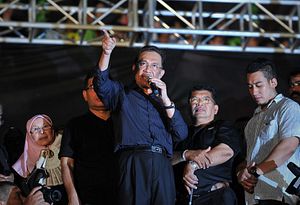Malaysia’s highest court decided Tuesday to reject an appeal and uphold a sodomy conviction against opposition leader Anwar Ibrahim, threatening to end his political career.
The ruling against Anwar means that he is likely to face a five-year prison term. It also means he would lose his parliamentary seat and may be unable to contest the country’s next election that has to be held by 2018.
Some also worry that the imprisonment of the opposition leader will play into the hands of Malaysia’s ruling party by undermining the opposition which has already been beset by political infighting in spite of winning the popular vote in the 2013 polls.
While the ruling United Malays National Organization (UMNO) headed by Prime Minister Najib Razak remained the world’s longest continuously elected ruling party following the 2013 election because it won more parliamentary seats, it was its worst performance ever and Anwar’s trial provided an opportunity to blunt opposition advances.
Anwar had risen within UMNO to become Malaysia’s deputy prime minister in the mid-1990s before falling out with the country’s then prime minister Mahathir Mohamad. Since then, he has spent several years in prison after being convicted of what many have called politically-motivated corruption and sodomy charges.
Anwar’s lawyers had appealed a conviction last March against their client for sodomizing a male aide in 2008. Sodomy is illegal in Muslim-majority Malaysia, and it can lead to imprisonment for up to twenty years.
But Judge Arifin Zakat, who read the verdict Tuesday, said there was “overwhelming evidence” against Anwar and upheld his five-year prison sentence.
In a statement issued following the ruling, the Malaysian government denied interference in the case, citing the fact that Malaysia has an independent judiciary. But the trial – known locally as Sodomy II after a similar Anwar trial in 2004 – has been marred by questionable evidence and glaring inconsistencies and has been roundly criticized by several human rights groups and experts.
David Wells, a forensic expert from the Victorian Institute of Forensic Medicine who had provided evidence in the earlier trial, told The Sydney Morning Herald that the scientific evidence led by the prosecution was deeply flawed.
After the ruling, Phil Robertson, the deputy director for Asia for Human Rights Watch, said in a statement that the verdict was a severe blow to human rights and democracy in Malaysia.
“Prime Minister Najib Razak’s government has persisted in its politically motivated prosecution of opposition leader Anwar Ibrahim at the expense of democratic freedoms and the rights to non-discrimination and privacy for all Malaysians,” Robertson said.
“Allowing this travesty of justice to stand will further undermine respect for rights and democracy in Malaysia.”
The decision also risks undermining Malaysia’s reputation just as the country has taken a more prominent role in the international stage in 2015, with its chairmanship of the Association of Southeast Asian Nations (ASEAN) – under the banner of a “people-centered ASEAN” no less, as The Diplomat has previously reported – as well as its non-permanent seat in the United Nations Security Council.
On Tuesday morning ahead of the verdict, the situation was tense. Hundreds of Anwar supporters had gathered outside the court waving opposition flags, with police officers stationed in the area in anticipation of potential violence after the verdict. Malaysian police had vowed to take legal action against potential troublemakers following the decision.
Last night, Anwar had said at a gathering of his supporters that he would not accept any outcome by the Federal Court other than his freedom.
Following the verdict Tuesday, Anwar took aim at the judiciary.
“In bowing to the political powers, you have effectively murdered the judiciary. You chose to remain on the dark side,” Anwar said.
“Allah is my witness. I will not be silent. I will never surrender,” he vowed.
































